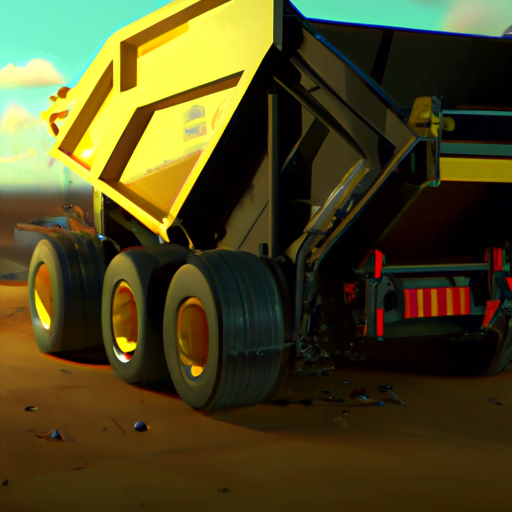-
Table of Contents
Dump Trailers 101: The Complete Guide for Beginners
Whether you’re a contractor, landscaper, or just a DIY enthusiast, a dump trailer can be an invaluable tool for hauling and dumping materials. But with so many options on the market, it can be overwhelming to know where to start. That’s where this guide comes in! We’ll cover everything you need to know about dump trailers, from the basics to choosing the right one for your needs. So, let’s dive in and get started on your journey to becoming a dump trailer pro.
What is a Dump Trailer?
A dump trailer is a specialized type of trailer designed to haul and dump various materials, such as gravel, sand, dirt, or debris. It features a hydraulic system that allows the trailer bed to tilt and unload its contents quickly and efficiently. Dump trailers are commonly used in construction, landscaping, agriculture, and other industries that require frequent transportation and disposal of materials.
Why Do You Need a Dump Trailer?
There are several reasons why you might need a dump trailer, including:
- Efficiency: Dump trailers can save you time and effort by quickly unloading materials at your job site or disposal location.
- Versatility: They can be used to transport a wide range of materials, making them a valuable asset for various industries and projects.
- Cost-effectiveness: Owning a dump trailer can save you money in the long run by reducing the need for rental equipment or hiring additional labor for material handling tasks.
- Safety: Dump trailers are designed to unload materials safely and efficiently, reducing the risk of injury or damage to your property.
Types of Dump Trailers
There are several types of dump trailers available, each with its own unique features and benefits. Some of the most common types include:
- Single Axle Dump Trailers: These trailers are smaller and more maneuverable, making them ideal for tight spaces and smaller loads. They typically have a lower weight capacity, ranging from 2,000 to 7,000 pounds.
- Tandem Axle Dump Trailers: With two axles, these trailers can handle larger loads and offer better stability on the road. They typically have a weight capacity ranging from 8,000 to 14,000 pounds.
- Gooseneck Dump Trailers: These trailers feature a gooseneck hitch, which connects to the bed of a pickup truck, providing better weight distribution and increased towing capacity. They are ideal for heavy-duty hauling and can handle loads up to 30,000 pounds.
- Deckover Dump Trailers: With a wider, flat deck, these trailers offer more space for loading materials and can accommodate larger equipment, such as skid steers or mini excavators. They typically have a weight capacity ranging from 10,000 to 20,000 pounds.
Choosing the Right Dump Trailer for Your Needs
When selecting a dump trailer, consider the following factors:
- Load Capacity: Determine the maximum weight of the materials you’ll be hauling and choose a trailer with a suitable weight capacity. Keep in mind that overloading a trailer can cause damage and reduce its lifespan.
- Size: Consider the dimensions of the materials you’ll be transporting and ensure the trailer bed is large enough to accommodate them. Additionally, consider the storage space available for the trailer when not in use.
- Towing Vehicle: Make sure your towing vehicle has the necessary towing capacity and hitch type to safely tow the dump trailer. Consult your vehicle’s owner’s manual for specific towing guidelines.
- Features: Look for features that will make your job easier, such as removable sides for easy loading and unloading, or a tarp system to protect your materials from the elements.
- Budget: Set a budget for your dump trailer purchase and consider both new and used options to find the best value for your needs.
Maintaining Your Dump Trailer
Proper maintenance is essential for ensuring the longevity and performance of your dump trailer. Here are some tips to keep your trailer in top shape:
- Regularly inspect the hydraulic system for leaks or damage and address any issues promptly.
- Check the tire pressure and condition before each use, and replace worn or damaged tires as needed.
- Inspect the trailer’s brakes, lights, and wiring to ensure they are functioning correctly.
- Keep the trailer clean and free of debris, especially in the hydraulic components and moving parts.
- Follow the manufacturer’s recommended maintenance schedule for your specific trailer model.
Conclusion
Dump trailers are versatile and valuable tools for a wide range of industries and projects. By understanding the different types of dump trailers, considering your specific needs, and properly maintaining your trailer, you can make the most of this investment and enjoy the many benefits it has to offer. So, whether you’re a seasoned pro or a beginner just starting, this guide should help you navigate the world of dump trailers and make an informed decision for your next purchase.



i agree this is very troubling